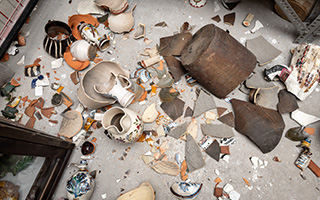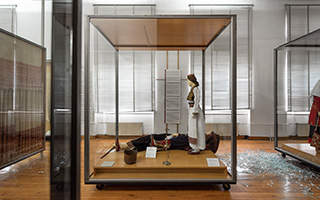The possibility that your city could face multiple hazards simultaneously has, in these unprecedented times, become an unfortunate reality. The ongoing COVID-19 emergency, in combination with the risk of an earthquake causing damage to life and property including cultural heritage, requires informed actions and responses.
With the aim of developing a common action plan and identifying priorities to manage the current crisis, ICCROM in partnership with UNESCO, INTERCOM (International Committee for Museum Management), ICOM Croatia, the Museum Documentation Centre and Ethnographic Museum, in Zagreb, organized a two-day online workshop on Learning from Disasters and Pandemics, on 4 and 5 May 2020. More than 135 professionals from different backgrounds, working in 35 different museums and cultural institutions in Croatia, attended this workshop. Professionals interested in this initiative also joined from Italy, Japan, New Zealand, Turkey, United Arab Emirates, United Kingdom and from the United States.
Building on the conclusions of the Ministerial Conference on Fostering European Cooperation for Cultural Heritage at Risk, held in Dubrovnik during the Croatia’s EU presidency from 26 to 27 February 2020, this workshop involved museum directors and decision-makers in Croatia. The aim was to encourage discussions on how to manage effectively the twin emergencies resulting from the earthquake on 23 March 2020 and the COVID-19 outbreak.
“COVID-19 and the resulting lockdowns have left cultural heritage vulnerable to a variety of risks. Combine that with additional hazards and you end up with museums and national institutions that are overwhelmed and in need of support”, said Webber Ndoro, ICCROM Director-General. “Through online training conceived within the framework of our programme on First Aid and Resilience for Cultural Heritage in Times of Crisis (FAR), as well as the resources and expertise that we make available, ICCROM aims to help cultural decision-makers make meaningful and strategic choices to safeguard and preserve heritage.”
Co-chaired by Goranka Horjan, Chair of INTERCOM, and Aparna Tandon, Senior Programme Leader at ICCROM, and coordinated by Yasmin Hashem of ICCROM, the workshop kickstarted with UNESCO colleagues, Sinisa Sesum and Cristina Menegazzi, highlighting the international emergency preparedness and response mechanism of UNESCO, and presenting the lessons learnt from the field.
Guest lecturers included Rohit Jigyasu (ICCROM), Eugénie Crété (CRATerre), and Alessia Strozzi (Italian Ministry of Culture), who discussed the assessment of needs and secondary risks post-earthquake and upon lifting lockdown, the assessment of buildings impacted by earthquake upon reopening, and the selection of a safe temporary storage area for collections.
Through the case studies presented by the Croatian Natural History Museum, the Croatian History Museum and the Archaeological Museum in Zagreb, it was possible to address and analyse the main existing challenges that may influence the proper response.
Ongoing maintenance and preventive care are crucial for effective disaster risk management. To achieve this, museums require adequate resources to mitigate risks to their buildings and collections. The current pandemic and the experience of managing an earthquake induced emergency have valuable insights to offer. The Croatian recent experience in having multiple disasters striking at the same time imposes new challenges for leadership in crises. The workshop therefore concluded with a discussion, led by the organising partners, on business continuity, available resources and the importance of inter-agency cooperation, with special emphasis dedicated to leadership and risk management in times of crises (see programme).
Programme and presentations of the workshop can be downloaded here.


